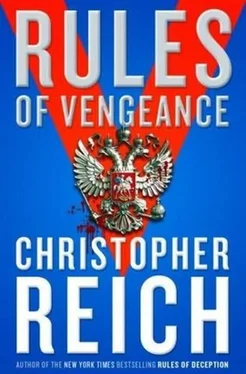“Right now I’m not thinking about myself. I want to know about Emma.”
“If you like, I can arrange for you to see her. Tomorrow you can be together. Far from here.”
“Not tomorrow. Today. Where is she this minute?”
“You would do right to consider my offer. I can make sure that you’re safely away from here. Free. Without the risk of lifelong incarceration. What do you say?”
“No,” said Jonathan. “I’ll take a pass.”
From the street below came the whoop of a siren. Jonathan glanced out the window to see two ambulances parting the sea of police officers and first responders. He looked back at Shvets, trying to imagine that this tired gray man in a rumpled suit was the director of the FSB.
“Where did you find her?” asked Jonathan.
“Lara? She comes from a town in Siberia on the Kolymsky Peninsula. A bleak place. Her father was a deckhand on a fishing vessel and was absent eleven months of the year. Her mother worked in a fish-processing factory and drank. She beat Lara. It was after she’d broken her arm and leg that an agency intervened. Lara was seven. We have a unit that searches for people like her. Bright, rootless, in need of the state’s assistance. Diamonds in the rough, you might say. Lara was brought to our attention by the director of her school. At thirteen she was doing differential calculus and had taught herself Italian, French, and German. Her IQ was off the charts.” Shvets looked away, his eyes suddenly alive, illuminated by the past. “I brought her to Moscow myself. You should have seen her. Such desire. Such ambition. Such emotion. And, of course, such beauty. Without a trace of Western corruption. She was a little thin, perhaps, with terrible eczema, but a man could see that with the proper nutrition and medical care she would ripen into something special.”
“Did you bother to ask her if she wanted to join the KGB?”
“We didn’t have to. It was her idea from the start. She was born to it. One of the rare few. She’s like a shark that will die if it stops swimming. Except in place of oxygen, she requires adrenaline. Don’t fool yourself, Dr. Ransom. She was never a nice girl.”
Jonathan stepped closer to the Russian. He felt the weight of the pistol in his hand. Closing his fingers more tightly around the grip, he thumbed the hammer into the cocked position. He’d killed before. He’d put the barrel of a gun to a man’s head and pulled the trigger. He had felt nothing. No remorse, no recrimination. Only a dull rumble somewhere deep inside that he’d done what was necessary. He decided that he despised Shvets. It would be easy to kill him. “Where is she?”
Shvets shook his head, staring at Jonathan as if he were an object worthy of pity. “I know why you’re here. You think you’ve come to stop her, but that isn’t really the truth. The truth is that you still love her. You think that somehow she will listen to you and abandon her mission. You’re wrong.”
“Be quiet.”
“Let me ask you something.”
“What is it?”
Shvets looked into Jonathan’s eyes. “Do you really think she betrayed Division just because she wanted to stop a jet full of civilians from being shot down?”
Jonathan didn’t answer.
Shvets continued. “The same woman who without the slightest qualm detonated a bomb on a busy street at midday in central London? Did they tell you how she killed Robert Russell? She broke his neck with her own hands, then pushed his body off the fifth floor.”
“The plane was different,” said Jonathan. “There were too many passengers. Too many innocent lives. She differentiated between people in her business and people out of it.”
“And what about all the others in her past? Do you even know how many operations she undertook on behalf of Division? How many innocents did she kill then?”
Jonathan fought to find an answer, but his mouth was suddenly dry. “What are you trying to say?”
Shvets rubbed his cheek, his steadfast gaze conveying a comradely understanding, some fraternal bond, as if he didn’t want Jonathan to suffer any more than he already had.
“No,” said Jonathan, without prompting. “I don’t believe you.”
“Surely you’ve suspected as much,” said Shvets. “You’re a smart man. You must have asked yourself why the sudden change of heart.”
“The plane was full of innocent civilians. Division had gone too far. She refused to allow it.”
“No, Jonathan, that isn’t the reason, and you know it.”
Jonathan shook his head, not wanting to hear what he knew in his heart to be true. What he’d suspected ever since he’d seen Emma in London.
“Emma has been working for me longer than you know,” said Shvets. “It was I who ordered her to stop Division from bringing down that jet.”
“You’re lying.” The words were weak, a rote response to an unimaginable treason. “I don’t believe you.”
“But you do. I can see it. I ordered her to thwart the attack on the El Al jet, not because I cared about the passengers, but because I intended to destroy Division.” Shvets scooted to the edge of the couch. “And you, Jonathan, helped me. It was you who killed General Austen. It was you who stopped the drone even when your precious Emma was too injured to complete her mission. The way I see it, she isn’t the only one working for me. You are, too.”
Jonathan sat down. Suddenly he was exhausted, the weight of too many hours awake and too few hours of sleep overcoming him. He knew that Shvets was telling the truth. Not because he felt it, or because he could see it in his eyes. But because nothing else made sense. In the end, there was no other logical explanation for Emma’s actions.
Jonathan turned and stared out the window. The police had come back down out of the building and he watched as someone was stretchered through the front door. He recognized a familiar face and looked closer. It was Graves, and behind him, DCI Ford. Jonathan had come so far. And now to learn this…
Jonathan caught a movement out of the corner of his eye. He spun in time to see Shvets leveling a pistol at him. He threw himself to the floor, raising his own pistol and firing. He saw a spit of flame and felt something cut the air close to his ear. Landing on his side, he cried out as his injured shoulder gave way, but somehow he kept pulling the trigger, the pistol bucking in his hand, the shots wild, undisciplined. Rolling to his feet, he brought the gun to bear, the sight centered squarely on Shvets’s chest. He pulled the trigger, but the clip was empty. He fired dry.
Sergei Shvets sat on the couch, one hand clutching his stomach. The other hand still held the gun, but it lay limp in his lap. “Bravo,” he said, in the same dull, unflappable tone. “I didn’t know marksmanship was one of your skills.”
Jonathan eyed the Russian warily. Approaching with caution, he knelt and pried his fingers off the pistol, then tossed it onto the floor out of reach. “Let me take a look.”
Reluctantly, Shvets lifted his hand. “And so? Will I live?”
Jonathan unbuttoned the shirt. The bullet had struck below the liver. Very little blood came from the wound. “How’s this? Tell me about La Reine and Emma, and I’ll save your life.”
“You’re not so mercenary.”
“No,” admitted Jonathan. “I’m not.” He retrieved some towels from the bathroom and wiped away the blood. “Lean forward,” he said.
Shvets grunted and did as instructed.
“Hold these firmly against your stomach and don’t move. I’m going to call an ambulance. I’ll let them save you.”
“Not necessary,” came a dry British voice. “We’ll take it from here.”
Charles Graves stood in the doorway, flanked by a squad of men in black assault gear.
Читать дальше












